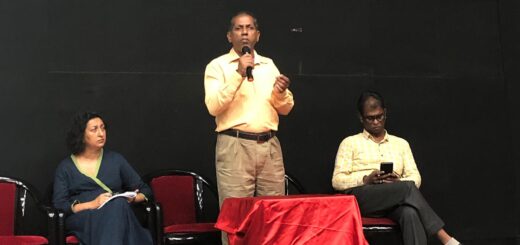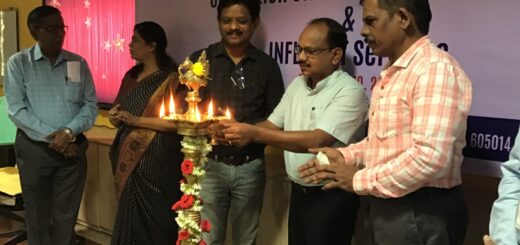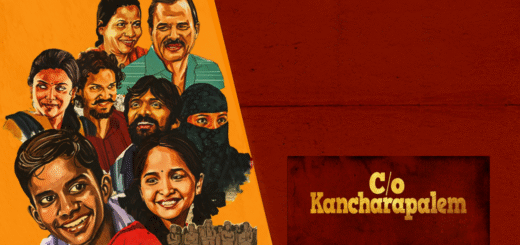International Seminar on Mahabharata

From left to right: Prof. C S Radhakrishnan, Prof. Christine Chojnacki, Mr. Phillipe Janvier-Kamiyama, Prof. (Mrs). Chandra Krishnamurthy, Dr. Radhavallabh Tripathi
The Department of Sanskrit, on occasion of its silver jubilee year organized a three day International Seminar on Mahabharata: The epic tradition in India and South East Asia from 10 – 12 February, 2014. The event was organized in collaboration with Universite Jean Moulin Lyon – 3 and Ecole Francaise‘d Extreme Orient with whom Pondicherry University has entered a MoU last year. The inaugural function of the seminar was held at the Convention cum Culture Centre, Pondicherry University on 10 February at 10.30 am.
Prof. C S Radhakrishnan, Head, Department of Sanskrit and Organising Secretary welcomed the gathering and explained the objective of the seminar. Prof. (Mrs). Chandra Krishnamurthy, Vice-Chancellor, Pondicherry University did the honour of lighting the lamp and delivering the inaugural address. In her speech she congratulated the department on its successful run for 25 years. She expounded the virtues of the Mahabharata as an epic and how it has influenced many vernacular poets over ages to compose poems and other literary works.
Mr. Phillipe JANVIER-KAMIYAMA, Consul General, Consulate General of France in Pondicherry and Prof. S.Pannirselvame, Dean, School of humanities delivered the felicitation address. Prof. Christine Chojnacki, Director, explained the scope of the seminar.
Dr. Radhavallabh Tripathi, former Vice-Chancellor, Rashtriya Sanskrit Sansthan, presented the key-note address on Discovering Mahabharata. In his address he spoke about the contrasting features of Mahabharata, which he dubbed as a heterogeneous mass of compilations. Over the years, many researches have been carried out on the topic of Mahabharata, drawing various inferences. While some believe it to be a depiction of Aryan invasion of India other merely see it as a victor’s journal. There are records in which Duryodhan, the eldest Kaurava and King of Hastinapur, is portrayed as the protagonist. And researchers believe that manuscripts showing Pandavas in a positive light must have been inserted after they won the Kurukshektra battle.
On one hand Mahabharata is a story of mass genocide, barbarism and cruelty while on the other hand it is a tale of compassion. And these strikingly opposite features are an inherent part of the epic, making it the most dynamic compilations of all time.
Dr. Valerie Gillet, Convenor, proposed the vote of thanks for the event. The seminar had three phases, with different panels discussing the various aspects of Mahabharata and its influence in India and South East Asia.
Photos: Kim Magnan
Krishnaveni Ilanthirayan
1st M.A. Mass Communication






